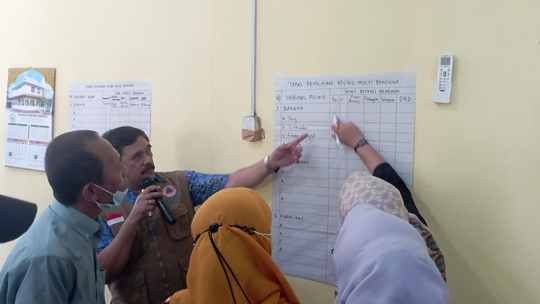Malnutrition in Asmat and Its 3 Effects on Child Development

Poverty is the primary determinant of malnutrition mediated through inadequate food intake, lack of medical care, insufficient access to sanitation, and poor hygiene and environment. This is one of the leading factors causing malnutrition in Asmat, Papua.
Reducing poverty and addressing malnutrition in Asmat, Papua, through various welfare measures, has been a major focus in Indonesia. While the central and local governments have implemented numerous welfare schemes focusing on livelihoods, health, nutrition, and education to alleviate poverty.
Malnutrition in children is associated with poverty and has many detrimental short-term and long-term consequences; poor health, cognitive impairment, child mortality in the short term, and the potential development of non-communicable diseases in the long term.
Nutrition-sensitive interventions for children are increasingly emphasized in poverty alleviation programs in developing countries, such as addressing malnutrition in Asmat, Papua. However, progress in reducing poverty and malnutrition metrics has been relatively slow and largely uneven. Many people still live below the poverty line, and millions of infants and young children are stunted in their growth in the year of …
Causes of Malnutrition in Children
Some children may experience malnutrition due to eating disorders, or psychological behaviors or conditions that make them avoid or refuse food. Malnutrition caused by poor eating habits is rare in Indonesia, but it can also occur if a child is neglected, living in poverty, or abused.
Malnutrition in Asmat, Papua can also be caused by difficulties in providing varied food for children, limitations of parents in terms of Infant and Young Child Feeding (IYCF), and unhygienic living environments. Nutrient deficiencies can result from either poor eating habits or problems with nutrient absorption from food.Here are some specific things that can increase the risk of malnutrition. Some health conditions that can cause malnutrition include:
-
Long-term conditions that cause loss of appetite, feeling sick, vomiting, and/or changes in bowel habits (such as diarrhea), including cancer, liver disease, and some lung conditions (such as chronic obstructive pulmonary disease).
-
Mental health conditions, such as depression or schizophrenia, which can affect mood and appetite.
-
Conditions that interfere with the ability to digest food or absorb nutrients, such as Crohn's disease or ulcerative colitis.
-
Dementia, which can cause someone to neglect their well-being and forget to eat.
-
Eating disorders, such as anorexia.
A person can also experience malnutrition if the body requires more energy, for example, if someone is in the healing process after surgery or a serious injury like a burn, or if experiencing involuntary movements like tremors.
Globally, the most common cause of malnutrition in Asmat, Papua is inadequate feeding of infants and young children. This can occur due to a lack of food in households. It is also caused by mothers not exclusively breastfeeding their babies for the first six months of life and by providing babies and young children with unbalanced, non-nutritious food, depriving them of sufficient energy and nutrition. Other important causes include infectious diseases such as diarrhea.
How Does Nutrition Affect Child Development?
Malnutrition in Asmat, Papua needs to be addressed as soon as possible. This is because the fact is that a child's growth and development are highly dependent on their nutritional intake. Nutrition is compounds found in food that are essential for health and life. Different nutrients have their own functions. Primarily, they provide energy, act as building blocks for growth and repair, and regulate chemical processes.
The human body cannot synthesize nutrients on its own, so we must obtain nutrients from our food. Therefore, a balanced diet consisting of all the necessary nutrients in appropriate amounts is required.
Although many are aware that a balanced diet maintains a healthy weight, its benefits go beyond just weight maintenance. Good nutrition is crucial for enhancing one's well-being and recovery from injury or illness. For adults, a balanced diet also lowers high cholesterol levels and strengthens the immune system to fend off diseases.
Good nutrition is always needed, especially for growing and developing children, regardless of age. Meeting nutritional needs is also beneficial for ensuring age-appropriate growth and development, reducing the level of malnutrition in Asmat, Papua. For every child, including those in Asmat, Papua, consuming a balanced diet during the first 1,000 days of life is crucial. This will have a significant impact as the child enters preschool. However, the preschool period, particularly between ages three and five, which is a crucial period, is influential in ensuring healthy lifelong development.
Childhood is always a critical period for building healthy growth and development, including physical, emotional, and mental abilities. Therefore, there is significant scientific interest in influencing children's nutrition levels from an early age to aid in their growth and development. Here are some reasons why nutrition is crucial for children.
-
Brain Development
High-quality nutrition is crucial for brain development, so reducing malnutrition in Asmat, Papua is essential. All nutrients contribute to brain development, but certain nutrients have a greater impact during the neonatal and late fetal periods.
These include iron, protein, iodine, folate, selenium, vitamin A, choline, and long-chain polyunsaturated fatty acids. It has been proven that brain development is most sensitive to infant nutrition between mid-pregnancy and two years of age.
Therefore, newborns should be breastfed as it provides the ideal and best mix of nutrients for brain growth.
-
Emotional Health
There is a misconception that nutritional levels will not affect emotional health. When it comes to our natural food intake, many do not know what to eat to regulate our emotions. However, nutrients such as vitamin B6, folate, and choline are crucial in synthesizing neurotransmitters, brain chemicals, which regulate memory and mood. Consequently, deficiencies in these nutrients are associated with mood-related emotions such as depression and anxiety.
Therefore, increasing the consumption of nutrient-rich foods such as fish and nuts and decreasing the consumption of junk food during a child's development significantly impacts their well-being and mood. Parents should also ensure their food intake includes omega-3 fatty acids, which help reduce stress and mood disorders. This is one solution to address malnutrition in Asmat, Papua.
-
Physical Health
A healthy diet with adequate nutrition is a good way to prevent malnutrition in Asmat, Papua. Malnutrition includes both undernutrition and overnutrition, both of which play a significant role in a child's lifelong development.
During childhood, undernutrition can lead to children having lower energy and interest during learning, negatively impacting their cognitive development and academic performance. It also affects physical growth and maturation, as well as height and weight.
Help Wahana Visi Indonesia fight malnutrition in Asmat, Papua through the programs we offer and visit their website for more information at https://wahanavisi.org/.



